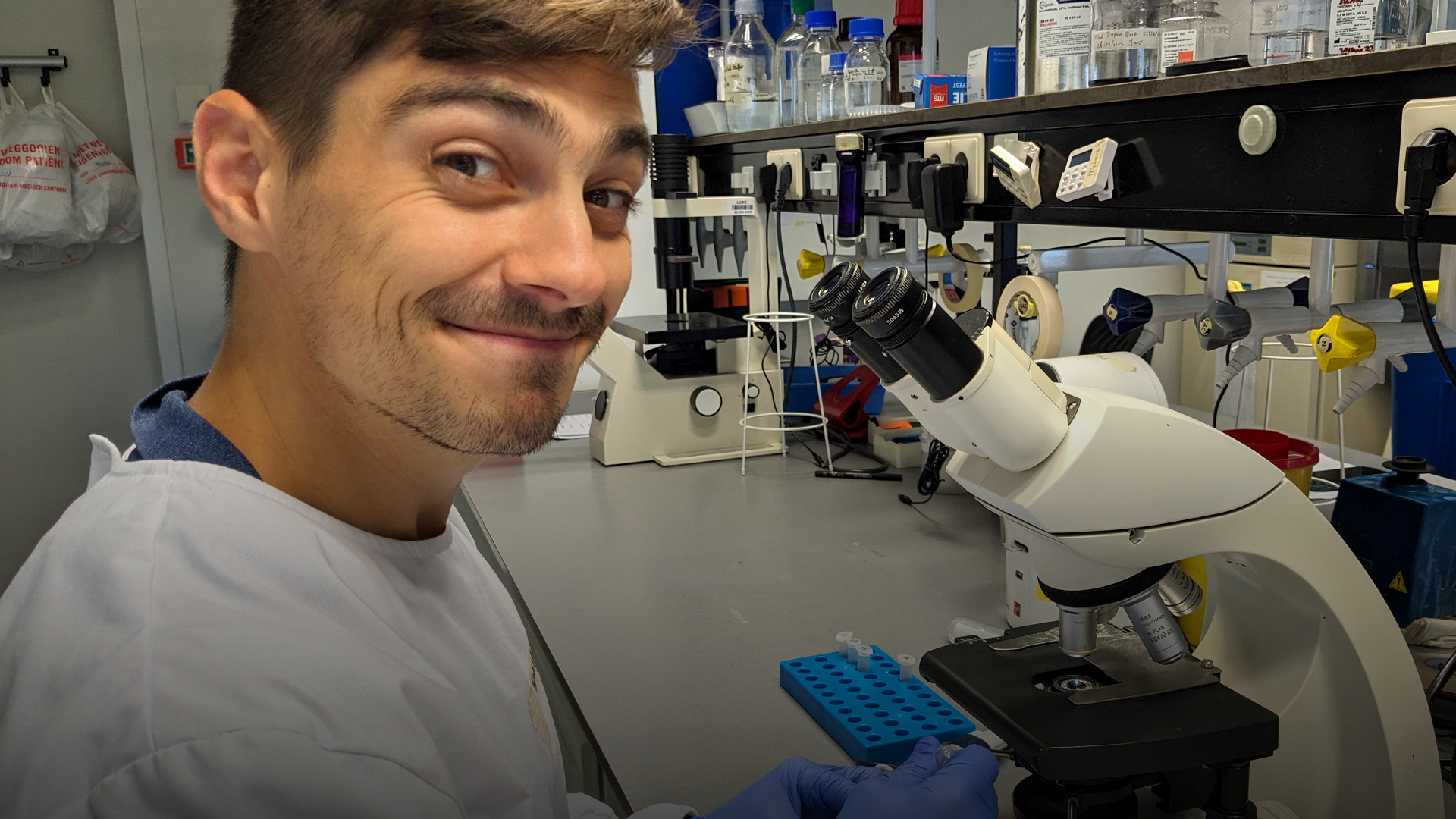‘Metabolism is just one angle that hasn’t been explored yet. It’s a very new area’
Dr Graham Heieis
Turning problems into puzzles has always been Graham Heieis’
approach to science. “It can be just incredibly mentally stimulating,
incredibly fun,” he says.
Some problems can also be hugely frustrating. “You need some
mental resilience, for sure. But seeing it like a puzzle to be solved
can be an attitude that maybe helps you get through some of
those tough times.”
A Postdoctoral Researcher at Leiden University Medical Center,
Graham’s current puzzle is understanding immune responses to
helminth infections.
Infections caused by parasitic worms, known as helminths,
are among the most common infections worldwide, affecting
an estimated 1.5 billion people. Symptoms can range from
general malaise to chronic malnutrition and impaired physical
development.
Dr Graham Heieis
“Immune responses to helminth infection have remained an
enigma for a long time,” says Graham. “We currently don’t have
effective human vaccines. We can clear helminths in mice, but why
we can’t do this in humans is still an ongoing and very active area of
research.
“Metabolism is just one angle that hasn’t been explored yet. It’s a
very new area.
“I’m in a unique position here in Leiden where we can combine
fundamental mouse studies with patient data to see whether
this will be a viable strategy for future developments of vaccine
strategies or small molecule treatments.”
Flow cytometry has emerged as a viable technique for studying
the metabolic profiles of individual cells. Other research groups
came up with the idea of using antibodies toward metabolic
transporters or enzymes, so Graham and the team started
looking into how to develop a flow cytometry panel to study
immune metabolism in tissues.
Here, a new piece of the puzzle appeared.
“The whole idea of targeting metabolic proteins is strangely quite
new to the flow cytometry world,” explains Graham. “So these kinds
of studies are incredibly expensive.
“We just don’t have the same availability of readily conjugated
antibodies and a variety of fluorophores as we do for most immune
targets.
“We thought that the only way we’d be able to do what we
wanted was to get bulk custom conjugations. But the cost can be
extortionate, not to mention the logistical challenge.”

Dr Graham Heieis
Graham sent a request to Abcam for price quotes on custom
conjugation. Instead, he got an email asking for a phone call to
discuss the project – and a possible solution.
“They were really keen on the whole idea, and they pointed us to
the right tools: their Lightning-Link® kits – direct conjugation kits
that are super easy to use and super robust.
“That was really what got us going on this project. If we hadn’t
been aware that this technology was available, I don’t know
what direction we would have gone. It kickstarted us in the right
direction.
“Once we got the antibodies, found the ones that worked well, and
found that these conjugation kits were working well for us, we just
went full steam ahead.
“What’s great is that Abcam has many recombinant antibodies
validated by knockout, which gives a lot of confidence in the results.
“We keep seeing the same results across repeated experiments
with the same antibodies, which gives us confidence that what
we’re seeing is biologically real.”
Unlocking solutions to research challenges relies on partnerships
like these, believes Graham. “Collaboration is hugely important to
just help things move forward and not get stuck.
“Things are always easier when you get along, and Abcam has
always been nice and easy to talk to. We’ll continue to use these
tools to support the research and keep generating more data
using our panel.
“We’re hoping that the fundamental discoveries we make could
one day serve as targets, or be considerations in either new
drug development or vaccine adjuvants for helminth infections.
Hopefully, it will be beneficial to the world at some point.”
Read about Graham's research in Nature Communications.
Abcam's recombinant antibodies are helping to boost Dr Graham Heies' immunology research. Explore our full range here.